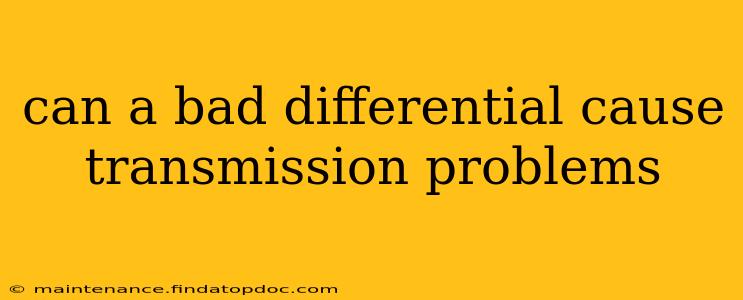A failing differential can indeed indirectly lead to transmission problems, although it doesn't directly damage the transmission itself. The connection is more about the stress and strain a malfunctioning differential puts on the entire drivetrain, ultimately impacting the transmission's longevity and performance. Let's explore this relationship in more detail.
How the Differential Works and its Relation to the Transmission
Before diving into the problems, understanding the differential's role is crucial. The differential allows the wheels on an axle to rotate at different speeds, essential for navigating turns. When you turn, the outside wheel travels a longer distance than the inside wheel. The differential makes this possible by adjusting the speed difference between the two wheels. It's connected to the transmission via the driveshaft, forming a crucial link in the power transfer chain.
How a Bad Differential Can Affect the Transmission
A malfunctioning differential can cause several issues that eventually stress the transmission:
1. Increased Vibration and Noise:
A bad differential, often due to worn gears or a faulty bearing, creates excessive vibration and noise. This increased vibration travels through the driveshaft and can put extra strain on the transmission's internal components, potentially leading to premature wear and tear. This is particularly true for manual transmissions, which are more susceptible to the effects of vibration.
2. Uneven Power Distribution:
A damaged differential might not distribute power evenly to the wheels. This uneven distribution can cause binding or jerking, which translates into added stress on the transmission's gears and clutches. Over time, this can lead to gear grinding, slippage, or even more severe transmission damage.
3. Binding and Overheating:
If the differential is severely damaged or locked, it can cause the wheels to bind, preventing them from rotating at their required speeds. This binding creates extreme resistance, which directly translates into increased strain on the transmission and driveshaft. The resulting friction can lead to overheating, further damaging both the differential and the transmission.
4. Broken or Damaged Components:
Significant differential damage, such as a broken axle shaft or a shattered differential case, can directly transfer the impact force into the transmission, causing significant internal damage. In this scenario, transmission failure is often a direct consequence.
Can a Bad Differential Cause Transmission Fluid Leaks?
While a bad differential itself won't directly cause transmission fluid leaks, the added stress and vibration it generates could potentially exacerbate existing transmission leaks or even weaken seals, making leaks more likely. However, this is an indirect consequence and isn't the primary cause.
What are the symptoms of a bad differential?
Symptoms of a bad differential can often be confused with transmission problems. Common symptoms include:
- A whining, humming, clicking, or grinding noise, especially during turns.
- Vibrations felt throughout the vehicle, particularly when accelerating or turning.
- A limited-slip differential may exhibit a "clunking" sound when turning.
- One or both wheels spinning at different speeds while turning.
When Should You Suspect Differential Issues?
If you notice any of the above symptoms, it's crucial to have your vehicle inspected by a qualified mechanic. They can diagnose the problem accurately and determine if the differential is the culprit or if there are other underlying issues impacting the transmission.
Addressing a malfunctioning differential promptly is essential to prevent further damage and costly repairs, both to the differential and potentially to the transmission. Early diagnosis and repair can save you significant expense and headaches in the long run.
